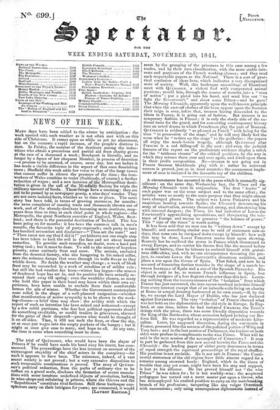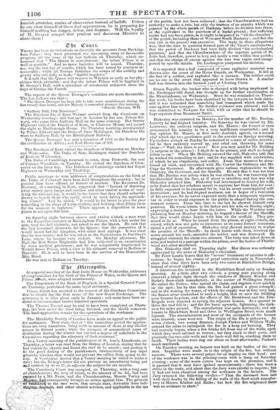A circumstance has occurred in the press which is unusually
sig- niticant : on the same day, Wednesday last, the Times and dip Morning Chronicle were in conjunction. The first " leader " of each paper was on the same subject and to the same effect ; the articles were so nearly to the same purpose that they might almost have changed places. The subject was Louis PHILIPPE and his suspicious bearing towards Spain ; the Chronicle denouncing his army of observation, seventy thousand strong, and threatening him with internal dangers; the Times, his bad imitation of Louis the Fourteenth's aggrandizing speculations, and threatening the mis- trust of Europe and means to preserve " the balance of power." This " sign of the times" is worth noting.
It has been said that no man can be "written down" except by himself; and something similar may be said of statesmen now-a- days, that none can be intrigued down except by himself: how well that may be done, Louis PHILIPPE seems bent upon showing. Scarcely has he outlived the storm in France which threatened to sweep Europe, and to scatter his throne first like the mound before a masked battery, than he labours to embroil himself with gratui- tous difficulties, and, with no one circumstance favouring the pro- ject, to emulate Louis the Fourteenth's disastrous ambition, :mil place a son upon the throne of Spain. That failed, and now he is accused of fomenting further troubles in the shape of a match be- tween ISABELLA of Spain and a son of the Spanish Pretender. His object is said to be, to restore French influence in Spain, lost through intrigues of a less flagrant character than this last. Learn- ing nothing from the inconveniences of the "isolation" from which France has just recovered, the man seems resolved to isolate himself from every interest except that of an imbecile exile living on charity at Rome or a royal demirep harboured at its own court,—if, by the by, we except the Lord Mayor of Dublin, who has just declared against ESPARTERO. The very "isolation" of France showed what was her hold on the diplomatists of the old style in Europe. In Eng- land, at one time, before he had imitated CHARLES the Tenth's doings with the press, there was some friendly disposition towards the King of the Barricades, whose accession helped to bring our Re- form Bill. He was regarded as a representative of moderate Libe- ralism. Later, his supposed discretion, during the war-mania in France, procured him the esteem of the political parties of Whig and Tory here ; and in the last session of Parliament, the leaders on both sides were profuse in compliments to the wise Prince. What will be said in the next session of the accomplice of CHRISTINA? It may in part be gathered from this new accord betwixt the Times and the Chronicle : the leading paper of either party denounces in terms of equal strength the equivocal proceedings of the royal shuifier. His position is not enviable. He is not safe in France : the Conti- nental statesmen of the old regime have little sincere regard for a roturier among crowned heads : England, which in the times of trouble that may yet come, might have been his stay and support, is lost to his alliance. He has proved himself not "the wise Prince" he was taken for ; he is but worldly-wise : the sceptered pedagogue has turned out a mere usurer put upon a throne, who has misemployed his exalted position to carry on the matehmEltuag branch of his profession ; tampering like any vulgar Overreach with successions; only using unscrupulous diplomatists Instead, of knavish attornies, armies of observation instead of bailiffs. Unless be can clear himself of these foul appearances, he is preparing for himself nothing but danger, defeat, and disgrace. Will the loyalty of M. GUIZOT compel that prudent and decorous Minister 'to share them ?



























